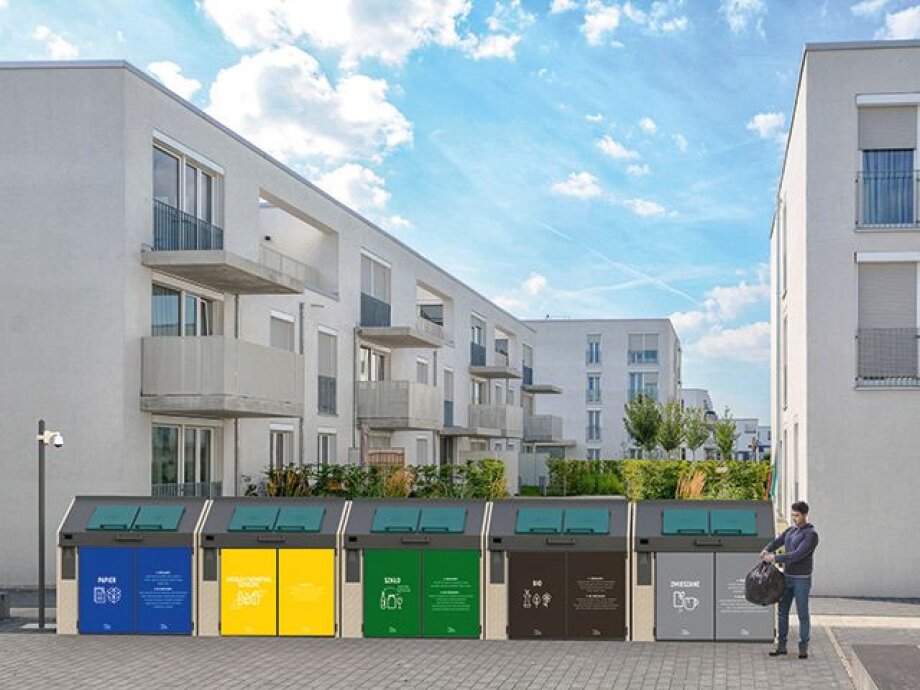WBJ: According to Eurostat data, Poles don’t produce more waste than the EU average, however, we still recycle far less than Western Europeans. On the other hand, data suggests that at least Poles’ awareness of the need to recycle is growing. You implemented a pilot program of smart waste collection in a multi-apartment estate in Ciechanów [90km north of Warsaw] last year. What does the data collected so far tell you?
Robert Szczepankowski: There are several key insights we’ve discovered. Based on hard data we collected over a 10-month program encompassing 310 apartments and over 730 residents, the most shocking fact was that residents produce far less waste than the statistical data would suggest. According to GUS [Poland’s Central Statistical Office], Poles produce each year 325kg of waste per person. Our measurements clearly indicated that the figure is at least 40 percent lower, about 194kg.
That is significantly less. Isn’t that suspicious?
One could think that people take their waste elsewhere. But that is impossible in the system we implemented. We know exactly how much waste each household produced and how often they took out the trash. The system is 100 percent transparent and impervious to tampering. Residents say that the solution we implemented forces them to recycle and they are complying because there is no other way. Before we introduced T-Master [an individual waste segregation system implemented in May 2019], only 10-12 percent of residents recycled.
Where is the number now?
As many as 95 percent started recycling immediately after the system was introduced. Another 2 percent were later convinced to do so by the building’s administration, while 2 percent are empty apartments.
That’s practically everyone. How effective is their recycling?
The quality of recycling in the pilot program is very good, around 82 percent. Meaning that if we open 100 bags, 18 percent contain waste they’re not supposed to. Teaching people how to recycle is a long-term process.
There is return information. It’s a technological solution that allows the system to easily identify which bag comes from which household. When the waste is incorrectly placed, a photo is sent directly to the apartment it came from.
Just like a speeding ticket…
Exactly. What allows us to do that is bar codes. Each household receives a set of single-use bar codes they put on a trash bag. They are different for each type of waste. And in order to dispose of waste, residents need to place a code on the bag and scan it – only then will the right container open.
What if you run out of codes, like when you run out of the right-color bags?
There are no limits, when you run out of codes – you get a new set. And we don’t offer bags, people buy bags themselves – any kind really. The only thing that matters is the code.
How much of the waste recycled by households in Poland is actually reusable?
Not that much. When people segregate their waste, 45 percent of it is recycled, 55 percent goes to a mixed-waste bin. We are working to bring this number down. Generally, public access is the biggest problem: if a container is accessible to anyone, all it takes is for someone to throw in a newspaper into a glass container to turn it all into mixed waste. That is why making the system air-tight is so crucial.
Still, it means that nearly half of the waste is now becoming a resource?
Not exactly. Right now, about 25 percent of the waste is bio-waste, 10 percent is paper, 7-8 percent is plastics, 7-8 percent is metal waste and glass. But that doesn’t mean all of the paper, plastic and metal are resources. Even if we look at paper alone: we need to separate paper food packaging, e.g., old newspapers. One is still waste, the other is a resource. Similarly, a clean bottle is different from a bottle containing oil residue. We also have no aluminum recycling or electric waste collection system.
It is even more complicated with biowaste. Right now you can only put it in your own compost container, you cannot hand it over. The Polish environment ministry is looking very closely at biowaste to change the law and allow for better biowaste disposal. For instance, biowaste from a multi-apartment building could be accumulated to reach about 200-300kg and then sold to a plant that can actually use it. We need to reform the system further to extract actual resources, not just different types of waste.
Is that why our recycling levels are so low compared to e.g., Sweden?
We should not compare ourselves with Germany, France or Scandinavia. Poles are still learning how to recycle. During our pilot program, people would ask questions such as: where do I put unfinished medications, batteries, even plastic bags. People receive this information and our system is very clear about it. But recycling isn’t easy and educating people takes time.
Has your pilot program in Ciechanów yielded any other surprising insights?
People have also been complaining about another thing: that they don’t have enough room in their kitchen to sort all the waste in different containers. They previously had only one bin, now there are five containers. Let’s remember that the estate we were implementing the program in is not a luxury apartment block in Warsaw. It is an ordinary housing estate like the majority we see in Poland.
How do they manage then?
They simply throw away garbage more often. We will present an innovative solution in May that could very well help remedy the space problem.
These issues notwithstanding, are people generally in favor of the T-Master solution?
As many as 85 percent said they do not want to go back to the previous system. When we were interviewing them, they raised another interesting and surprising argument. They are happy that the system is equipped with cameras, something we were afraid would cause opposition. They say the cameras also keep watch over their cars parked behind the garbage shed.
Once the pilot program is complete, is there a next step to take this solution nationwide? Who would be responsible for introducing it on a larger scale?
For cities with up to 100,000 inhabitants, city authorities have the deciding role. The software that comes with the system will be theirs to use. For larger cities, the decision is made at the borough level. After all, they are responsible for waste disposal and they incur the costs of improper waste segregation.
We are being contacted by the first homeowners’ associations too. They started calculating the fines they will have to pay if they don’t make their residents adhere to the recycling rules and it turns out that investing in a solution that will help them avoid these fines is simply cheaper.
There seem to be no other way to make people recycle than to make them individually responsible for their own waste. After all, recycling in stand-alone housing estates is much better than in multi-family estates?
That’s true. People want to pay for the amount of waste they produce. An elderly woman who lives alone and recycles does not want her charges to increase because her neighbors, six students in a rented apartment, do not recycle.
Doing away with anonymity is what makes people feel responsible. It is also the aspect the environment ministry is very interested in.
Your system also weighs the waste it collects. That should be quite useful for the authorities responsible for waste disposal, right?
One of the key elements of the system is weighing the waste as it comes in. Authorities often ask us why we do it. Mass is the indicator that is used when the city pays for waste disposal, not volume. We need to know how much waste is being collected.
We could very well turn waste into resources, thanks to such systems. When a homeowners’ association or cooperative signs an agreement for waste paper, the company responsible for it can come in when the mass reaches 300kg, for instance. Then they wouldn’t have to waste their time and fuel coming for a half-empty container.
There are many inefficiencies in the waste disposal system that can be remedied with the right use of technology. If we apply it wisely, it could be a real breakthrough.

ROBERT SZCZEPANKOWSKI
CEO and head of the management board of T4B – a Warsaw-headquartered tech firm, that states on their website that they “not only create innovative products but also show an innovative approach



















